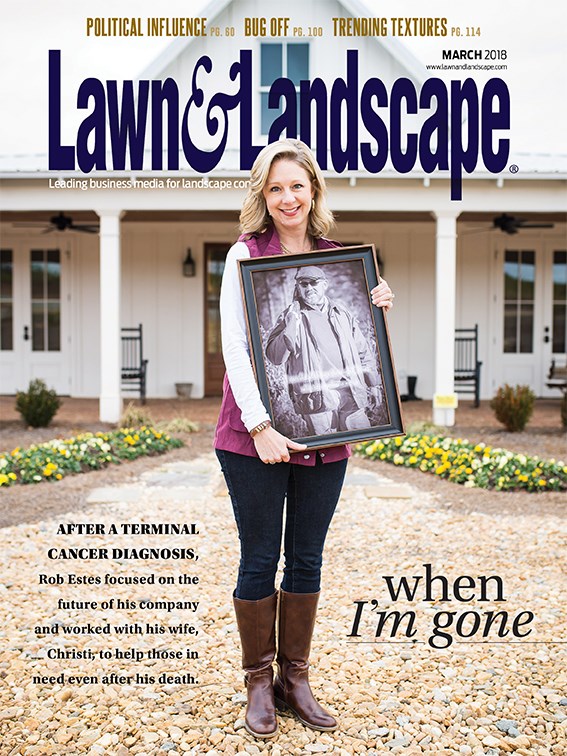
In the last year, the stock market has boomed, customers are spending more and many landscape contractors say they’re seeing an increase in business. Industry professionals were optimistic after the presidential election, according to a January 2016 Lawn & Landscape survey, and after a year of President Donald Trump’s administration, contractors are seeing benefits of an upturn in the stock market.
At The Green Team based in Roanoke, Virginia, 2017 was the best year they’ve ever had since the business opened in 2006, and the company used the profits to purchase a new spray truck as well as some other smaller equipment.
“Consumer confidence is probably at a 20-year high, maybe even more than that,” says Kyle Rose, business development officer at The Green Team. “I think that definitely plays into it with people’s 401(k)s doing really well and you see all these bonuses companies are giving out so I think people are getting a little bit extra income that they can play around with too.”
Contractors say their votes have had an impact on the economy and the boom in business. Eighty percent believe the office of the presidency has some impact on the industry.
“I would say I believe it drastically does have an impact because all decisions made politically, either in state or federal, in the end they all have something to do with our stock market,” says Ryan Wikman, landscape designer and owner of Chestnut Grove Design Group in the Boston area.
Chris Lusk, owner of Global Design Landscapes in Virginia Beach, Virginia, says he noticed an increase in business toward the middle of last year as the economy improved. His repeat customers are getting more confident and spending more money.
“I have grass cut clients constantly,” he says. “I always give them estimates to do their landscapes or do hardscapes but they always push it off because of money situations. Last year, I got quite a few of those customers that decided to say, ‘Yeah, yeah, I’m going to do it. I’ve got a little bit more money. I feel a little bit more confident. Let’s knock it out.’ I have seen a lot of that.” He has also seen about a 15 percent increase in new customers, which surprised him since he didn’t do any advertising. Many landscapers have seen an uptick in spending in the last year. For Wikman, he says the majority of his client base is middle class and have a decent amount of money in the stock market. With the improvement in the market, they’re willing to spend more money.“For most people, it’s a luxury item,” he says. “That’s exactly what it is and when people are willing to spend money because the economy is doing well and the money that they have invested is growing. It’s beneficial to me and I can see that.”
“Consumer confidence is probably at a 20-year high, maybe even more.” Kyle Rose, The Green Team
However, no one knows how long that’s going to last.
“We’re kind of in a bubble right now so it’s going to need to regulate again at some point, but when is that?” Wikman says. “It’s beginning now, but who knows?”
Randall Province, owner of Oak Hill Landscape Design & Maintenance in Bartlett, Tennessee, has customers who watch the stock market constantly and while things are going well, he knows they also apprehensive.
“They’re thinking, ‘We’re doing great right now but what if we get to tomorrow and everything’s gone? It’s going too good for it to last and it’s probably going to end up really bad,’” he says.

Minimum wage.
According to Lawn & Landscape research, more than half of landscapers say they’re concerned about a minimum wage increase. That could mean big trouble for contractors, many of whom are already concerned about being undercut by companies who pay their workers lower wages.
“I run into this all the time,” Province says. “That’s why they’re so popular – they’ll work for a lot less money and they’ll work their butts off. It’s already hard on competition. They can literally get the job done faster and hire more people by paying them less because I’m paying my guys more.”
If wages were to rise, landscapers say they would have to employ fewer workers or pass the additional cost on to their customers. Or, in some cases, both.
Province starts his employees out at $10 an hour, with a dollar increase after nine months. He says if the minimum wage were to increase to $15 an hour, he would have to pay $17 to start in order to stay competitive.
At Global Designs Landscape, Lusk pays $3 over the minimum wage at $10 an hour, except for one employee who makes $13. He doesn’t see any benefit to raising the minimum wage since it would raise the price of everything else.
“My whole philosophy when it comes to minimum wage is that minimum wage is not something that you’re going to live the rest of your life with,” he says. “Minimum wage is there to better educate yourself and further grow to down the road and gain more money. So if you keep raising minimum wage, no one’s going to want to get themselves educated to go further in life.”
He says that if the minimum wage were to increase, he would have to pass that cost on to his customers.
And since some of them would be unable to pay the higher prices, he would also have to let some people go.
Province has a similar sentiment. “If I have to increase my prices, everyone else is going to have to increase their prices too,” he says.

To Rose, setting a national minimum wage doesn’t make sense at all given the differences in cost of living across the country. He says the free market should take care of determining wages, noting that companies that pay better will be able to provide better service, pushing lower paying companies out of business or forcing them to pay higher wages.
With competition already high, concerns about illegal workers are also front of mind. In Memphis, Province knows of an intersection where construction companies and others hire illegal immigrants as day laborers.
“It’s frustrating because I’m not going to do that,” he says.
Moving forward.
In the coming years, landscape contractors are hoping for a variety of changes. Many want to see less in-fighting from Congress and progress on campaign promises for stronger immigration control. Others want to see health care and tax reform, and a focus on the tasks at hand.
“Right now, the whole administration reminds me of a bunch of frat boys in a fight over something,” Province says. “They need to shut up, sit down, put on their big boy pants and do their job. Quit bickering, work together and work for what you’re getting paid for.”
Wikman hopes to see the government pass a working budget. As a business owner, he says that’s how you base your yearly plans.
“It’s pitiful,” he says. “It’s embarrassing, so that’s the one thing I hope they can actually do for once. If we have a government that can’t even do that, then what’s the point?”
Rose is hoping President Trump will build a wall on the Mexican border. The Green Team has always hired American workers, which is one of the things customers like about the company, Rose says. “We’ve heard from a lot of our customers that actually came from other companies and called us because they had people out on their property that can’t even speak English,” he says.
And he sees cutting down on illegal immigration as a positive for the entire industry.
“Quit bickering, work together and work for what you’re getting paid for.” Randall Province, owner, Oak Hill Landscape
“It’s putting more of our guys to work and it gives us a better outlook because a lot of people see landscape companies as the bottom of the barrel to go to work for but I feel like if they hired more professional people that actually want a career instead of an illegal immigrant or something like that, then I think there wouldn’t be such a bad stigma on our industry.”
Conflict and differing opinions and the general political climate has become an issue for Province at Oak Hill Landscape.
“The overall atmosphere with most of my clients when you talk to them is they’re not happy with the way those things are going. They’re disappointed in the leadership, etc., so therefore they’re not in the same mood that they would normally be,” Province says. “It has affected us directly mostly in open communication. We’re not communicating as well anymore. It’s like, ‘Well were you a Trump supporter? Are you a Trump supporter?’ It can be a bone of contention very quickly.”
Half of Oak Hill Landscape’s staff is made up of veterans, which has caused a lot of anxiety, especially for those on limited disabilities. “The Trump administration has affected them negatively quite a bit on benefits and what they can and cannot do it, and it’s very frustrating,” he says.
“And it really disturbs them, and it puts a lot more weight on their mind. It makes it a little more challenging to communicate because their mind is so concentrated on all this other stuff that they’ve got to figure out and they’re scared. They’re apprehensive. They don’t know what to do.”

Explore the March 2018 Issue
Check out more from this issue and find your next story to read.





